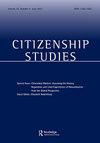Self-Il/legalisation and political subjecthood: Syrian migrant women in the EU
IF 1.9
3区 社会学
Q3 POLITICAL SCIENCE
引用次数: 1
Abstract
ABSTRACT This paper analyses how kinship in its intersection with the law shapes female migrants’ gendered vulnerabilities, but also their political subjecthood. My ethnographic fieldwork in Athens from 2017–2020 with young adult Syrian women shows that female migrants prefer to remain undocumented in Greece, because so-called ‘illegal’ smuggling routes remain their best bet for reaching Central/Northern Europe. I read their strategies of ‘self-il/legalisation’ as ‘ambivalent’ yet ‘generative’ political acts. By selectively and simultaneously working with and against the EU’s border regime and kin-related legal and socio-cultural structures, acts of self-il/legalisation oppose the infantilisation of women as secondary to male citizens, and of non-citizens as outsider, non-political subjects. I argue that in doing so, female migrants enact an ambiguous political subjecthood that defies classic binaries of the personal/political, citizen/refugee, law/culture and legal/illegal, and also unmask the false claims to rationality, modernity and neutrality upheld in the EUs migration and asylum regime, exposing instead its racialised and heteropatriarchal foundations.自我/合法化与政治主体性:欧盟的叙利亚移民妇女
本文分析了亲属关系与法律的交叉如何塑造女性移民的性别脆弱性,以及她们的政治主体性。2017年至2020年,我在雅典对叙利亚年轻成年女性进行的民族志实地调查表明,女性移民更喜欢在希腊保持无证状态,因为所谓的“非法”走私路线仍然是她们到达中欧/北欧的最佳选择。我把他们的“自我意识/合法化”策略解读为“矛盾的”但“生成的”政治行为。通过有选择地同时与欧盟边境制度以及亲属相关的法律和社会文化结构合作和反对,自我保护/合法化行为反对将女性视为次于男性公民的幼稚化,反对将非公民视为局外人、非政治主体的幼稚化。我认为,在这样做的过程中,女性移民建立了一种模糊的政治主体地位,挑战了个人/政治、公民/难民、法律/文化和法律/非法的经典二元对立,也揭露了欧盟移民和庇护制度中对理性、现代性和中立性的虚假主张,反而暴露了其种族化和异父权制的基础。
本文章由计算机程序翻译,如有差异,请以英文原文为准。
求助全文
约1分钟内获得全文
求助全文
来源期刊

Citizenship Studies
POLITICAL SCIENCE-
CiteScore
3.60
自引率
11.10%
发文量
85
期刊介绍:
Citizenship Studies publishes internationally recognised scholarly work on contemporary issues in citizenship, human rights and democratic processes from an interdisciplinary perspective covering the fields of politics, sociology, history and cultural studies. It seeks to lead an international debate on the academic analysis of citizenship, and also aims to cross the division between internal and academic and external public debate. The journal focuses on debates that move beyond conventional notions of citizenship, and treats citizenship as a strategic concept that is central in the analysis of identity, participation, empowerment, human rights and the public interest.
 求助内容:
求助内容: 应助结果提醒方式:
应助结果提醒方式:


